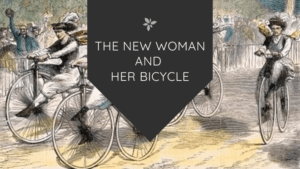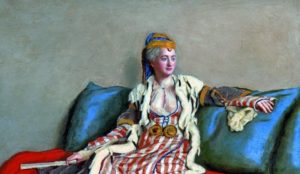“I am a woman who came from the cotton fields of the South. From there I was promoted to the washtub. From there I was promoted to the cook kitchen. And from there I promoted myself into the business of manufacturing hair goods and preparations….I have built my own factory on my own ground.” Madam Walker, National Negro Business League Convention, July 1912
Madam C.J. Walker was born Sarah Breedlove in 1867, the first child in her family born into freedom after the signing of the Emancipation Proclamation. Her parents and five older siblings were slaves on a plantation in Louisiana. By the time of her death in 1919, Madam Walker was the wealthiest black woman in America and the first self-made female American millionaire.
Sarah’s parents died when she was only 7 years old, and she moved in with her sister and brother-in-law and soon began working to help support their family. She married when she was 14 to escape her brother-in-law’s abuse. Her husband died when Sarah was 20, leaving her to raise their 2-year-old daughter A’Lelia by herself.
Sarah began experiencing hair loss at a young age. Hair loss was a very common problem at the time: people found it difficult to bathe and wash their hair as often as we do today because most lacked access to things like indoor plumbing, central heating, and electricity. Sarah began experimenting with different products and home remedies, eventually creating her own shampoos and hair treatments.
She named her company after her husband at the time, Charles Joseph Walker, and began selling products such as “Madam Walker’s Wonderful Hair Grower” and “Madam Walker’s Vegetable Shampoo”. Designed specifically for black women, her hair products were completely unique at the time. She began selling her products door-to-door, and teaching the women she met all about hair and scalp treatments.
Her business was so successful that she was soon selling her products across the United States. Sarah’s daughter A’Lelia ran a mail-order business from Denver while Madam Walker traveled the states, finally settling in Indianapolis where she opened her own factory. After establishing her headquarters there, she expanded her company internationally to Jamaica, Cuba, Costa Rica, Panama and Haiti. Her company employed thousands of people, including many African-American women, and was the largest African-American owned business in the nation.
Not only was Madam Walker create incredibly successful business against all odds, she also used her wealth to oppose racism and support institutions to assist African-Americans. She said that she wanted to be a millionaire not for herself, but for the good she could do with it. Besides lecturing on these issues at various conventions, Sarah also:
- Made the largest contribution to save the house of Frederick Douglass
- Donated money to the NAACP, the YMCA, and to black schools, organizations, individuals, orphanages, and retirement homes
- Spent $10,000 every year for the education of young black men and women
- Encouraged political activism in her employees
- Joined the leaders of NAACP in their efforts to support legislation to make lynching a federal crime, even going herself to the White House to petition in favor of anti-lynching legislation

Today there are two National Historic Landmarks associated with Madam Walker: her New York estate called Villa Lewaro, and the Madam Walker Theatre Center, built in Indianapolis in 1928, which is now a cultural arts center. She also appears on a commemorative United States Postal Service stamp as part of its Black Heritage Series.
Much of what we know today about Madam Walker is due to the efforts of her great-great-granddaughter, A’Lelia Bundles, author, journalist & public speaker who runs the official Madam C. J. Walker website and is her official biographer. Images in this post are used with her permission.
Recommended Reading
Keri is a blogger and digital marketing professional who founded Amazing Women In History in 2011.





I just wanted to inform your readers of this very important fact – Madame C.J. Walker’s historic company still exists today and has never stopped manufacturing all of the original hair oils! Anyone who visits our website at http://www.madamewalker.net can view and purchase the full product line.
The website also contains valuable information about the stock / asset sale (including the ability to view the stock certificates) and Raymond Randolph’s purchase of the original Madame C.J. Walker Manufacturing Company in 1985 from the Walker Trustees in Indianapolis, Indiana and how the Randolph Family continues to keep Madame Walker’s true legacy alive.
To promote the entrepreneurial spirit that Madame Walker exemplified, the website provides individuals the opportunity to become a “Walker Agent” and sell Madame C.J. Walker products. By clicking on the “Distributor” tab, you will see agents located in the United Kingdom, France, Bahamas, and the United States.
September 2011 marked the Centennial Anniversary of the incorporation of Madame C.J. Walker’s historic company – doing business today as Madame C.J. Walker Enterprises. On September 24th, 2011 we commemorated this event with the “Tracing the Footsteps of a Legacy” 100th Year Celebratory Walk. You can visit our website to view the Souvenir Program.
Due to our ownership of Madame’s historic company and the historical documents and memorabilia of the company, the Randolph Family can provide the most detailed and historically accurate information about Madame C.J. Walker and her company by calling toll free, 866-552-2838, by clicking on the “Frequently Asked Questions” FAQS tab of our website, or by going to the contact us page of our website.
Angela Randolph
http://www.madamewalker.net
It is amazing what she was able to accomplish, not just as an African-American woman, but for any woman of that time period. I enjoyed the post thank you!
Thanks so much for ALL of the information you share about women in history. Your contributions are greatly appreciated.
Yes, Ms. Walker was an amazing entrepreneur. I wonder why a significant part of the marketing of her brand denies that she got her start through Annie Malone, the founder of PORO Beauty College and the PORO System of Hair Care? When Ms. Sarah Breedlove met Mr. Walker, she sold PORO Products. In fact, she indicated that she was the sole representative of PORO in Denver. It is amazing that she then called one of her products “The Wonderful Hair Grower.” The identical name of Annie Malone’s product that she developed in 1902. Why not give credit where credit is due? The New York Times should do its research before publishing misinformation.
Very interesting, Evelyn- thanks for commenting!!
That’s great to know ill shear the info with my friends.
A great site to visit regarding African American history is http://www.mysphinxknows.com/